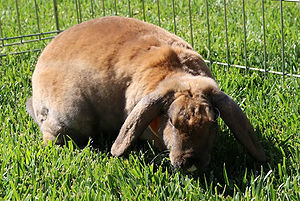Grass
If your rabbit turns his nose up at all sorts of hay or you would like to save some money on hay, you may also use your lawn as a source of food and fiber for your rabbit if it has not been treated with any chemicals. Remember that you should introduce all new foods gradually, and slowly increase your rabbit's fresh grass intake over a period of time.
Precautions when feeding grass
Large amounts of fresh grass is not recommended for rabbits under 6 months of age.[1] However, small amounts of fresh grass can be a nutritious addition, and young rabbits can be given a blade or two.
Do not use lawn mower clippings to feed your rabbit. The heat and crushing action encourages fermentation of the grass which will lead to an upset stomach if your rabbit eats it. Only use hand-pulled or hand-cut grass to feed your rabbit, or let your rabbit graze on the lawn directly. Be sure that the grass has not been treated with any pesticides or chemicals.
Taking your rabbit outside
Another option to get your rabbit fresh grass is to let it outside and browse on its own. Check out the article Rabbits outdoors for more details on how to build something to allow your rabbit to stay safe and not escape outside.
Make sure the grass has not been treated with any chemicals, and your rabbit will not be in danger from dogs, cats, hawks, and other predators. Do not allow bunnies to graze on recently fertilized pasture, pasture sprayed with weedicide or where dog droppings are present.
Bacteria and fungi may be present and parasite eggs may adhere to grass blades if you live in an area frequented by wildlife and cats or dogs. Myiasis and warbles can also be a danger to outside rabbits if flies are present.
Growing grass indoors
If you are not comfortable with allowing your rabbit to go outdoors due to the various risks, growing grass indoors can be a solution. Growing fresh wheatgrass, barleygrass, buckwheat, or oatgrass is very easy.
Barleygrass and wheatgrass are extremely high in beta-carotene, high in the B-complex vitamins, vitamins E and K, phosphorus, magnesium, potassium, protein, and other nutrients.[1] They also contain large amounts of silicates that will help wear a rabbit's teeth.[1] Fresh-grown wheatgrass, if it is not washed before giving it to the rabbit, can also provide of source of vitamin B12, which is produced by bacteria on the wheatgrass.[1]
Further reading
- The Rabbit House. (2011). Making Your Own Hay
- The Rabbit House. (2011). Why Grass/Hay is good for Rabbit’s Teeth
- The Rabbit House. (2009). Rabbits Eat Grass
See also
References
- ↑ 1.0 1.1 1.2 1.3 Moore, L. (2013). Rabbit nutrition and nutritional healing. (2nd ed.).


